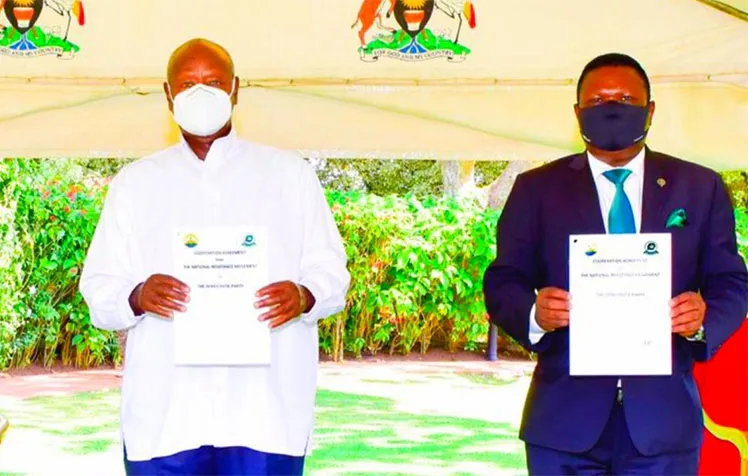The Democratic Party (DP) president, Norbert Mao, has provided clarity regarding his party’s relationship with Uganda’s ruling National Resistance Movement (NRM), emphasizing that the two entities are not in a coalition.
Mao made these remarks during a press briefing at the DP headquarters, where he outlined the nature and scope of their collaboration while addressing critics.
Cooperation, Not Coalition
Mao underscored that the DP’s engagement with the NRM is a structured form of cooperation rather than a merger, coalition, or alliance.
He likened this relationship to a business partnership, where two companies work together for mutual benefit without compromising their individual identities.
“Political parties have various ways of engaging with each other, and the lowest level of relationship is cooperation. The DP has not merged with the NRM, nor are we in a coalition or alliance. We are cooperating. This is akin to a partnership between companies—it doesn’t dissolve their identities,” Mao explained.
He further compared this arrangement to the Inter-Religious Council of Uganda (IRCU), where faith-based organizations collaborate while maintaining their distinct principles.
Addressing Criticism
Mao dismissed allegations that the DP has lost its independence by working with the NRM. He urged party members to stay focused on the broader vision and ignore detractors.
“Let us not be distracted by unserious critics. DP has its plans—some of which are not for public consumption—and we will remain steadfast in pursuing them. To remain relevant in the political landscape, you must speak the language of the ruling party,” Mao asserted.
According to Mao, the DP-NRM cooperation aims to place the DP at the forefront of Uganda’s national agenda, particularly on critical issues such as constitutional reforms, peaceful transitions, and national dialogue.
A Call for Constructive Engagement
Criticizing what he referred to as “political masqueraders,” Mao stressed the importance of constructive engagement in shaping Uganda’s future.
He argued that genuine opposition requires participation in meaningful discussions, not mere criticism.
“I have more respect for those who have taken up arms than for those masquerading as opposition while refusing to engage. Collaboration is not surrender, nor is it alignment with the policies of the NRM,” he said.
Mao also dismissed speculation about the DP’s decline, reiterating his commitment to revitalizing the party and ensuring its relevance in Uganda’s evolving political landscape.
Strengthening the Party’s Presence
Mao turned his attention to the Democratic Party’s plans for Kampala, a region he described as central to the party’s activities.
To enhance its influence, the DP plans to establish five administrative districts within the city, reflecting its population size and economic significance.
Beyond Kampala, Mao highlighted the need to leverage Uganda’s cultural and demographic diversity as a strength.
“Our diversity is a blessing, not a curse. Dominance by any single group is dangerous. Inclusive politics that celebrate our differences are the key to national unity,” he stated.
Federalism and Decentralisation
Addressing Uganda’s stagnated decentralisation process, Mao called for a shift toward federal governance.
He described federalism as the “highest state of decentralisation,” with the potential to empower local communities, ensure equitable development, and enhance accountability.
“Decentralisation in Uganda has faltered, leaving many districts underdeveloped. Federalism would bring decision-making closer to the people and promote balanced development,” he argued.
Mao cited examples from successful federal systems in countries like the United Kingdom and India to illustrate its benefits.
In particular, Mao was critical of Kampala’s governance system, accusing both technocrats and politicians of failing to address the city’s pressing challenges.
Advocating for Electoral Reforms
Mao also proposed sweeping electoral reforms to enhance transparency and credibility in Uganda’s elections.
He advocated for the introduction of electronic voting systems, incorporating biometric verification through fingerprint and facial recognition technologies.
“Elections should not be a matter of life and death. We must cultivate a culture of peaceful and transparent elections,” he said.
While acknowledging concerns about network reliability and potential hacking, Mao expressed determination to champion these reforms.
Future of the DP-NRM Agreement
Mao confirmed ongoing discussions with the NRM regarding the renewal of their partnership agreement, which expires in 2023.
The agreement, originally signed in 2022, saw Mao appointed as the Minister of Justice and Constitutional Affairs—a move that has since divided the party.
Notable critics, including DP MPs such as Lulume Bayiga (Buikwe South), have questioned Mao’s leadership.
Nevertheless, Mao remains confident that the Democratic Party will maintain its position as a key player in Uganda’s political arena.
A Vision for Uganda’s Future
As the press briefing concluded, Mao reiterated his commitment to the Democratic Party’s core values of national reconciliation, constitutional reform, and inclusive governance.
He urged party members to stand united, focus on long-term objectives, and resist the distractions of political rhetoric.
“DP has withstood the test of time. Our resilience and commitment to Uganda’s future will keep us relevant for years to come,” Mao said.

